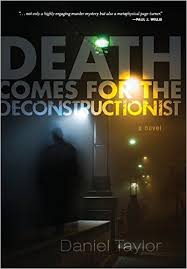 Daniel Taylor, Death Comes for the Deconstructionist (Eugene, OR: Slant, 2014).
Daniel Taylor, Death Comes for the Deconstructionist (Eugene, OR: Slant, 2014).
Daniel Taylor’s Death Comes for the Deconstructionist is a story about a man, a murder, and a movement.
The man is Jon Mote, grad school dropout (all but dissertation), soon-to-be ex-huband and researcher for hire who is asked to look into the death of his former dissertation director, Richard Pratt. The murder victim, Pratt, was a Deconstructionist literarature professor whose luster, once avant-garde, is already becoming passé. The movement is Deconstructionism, which is complex and hard to explain, but for the purposes of this book holds that words point only to other words, not a reality outside themselves. Assertions of inherent meaning are really, then, just power plays between groups. In killing off Richard Pratt, then, Daniel Taylor kills of Deconstructionism too.
Taylor is an insightful stylist. Any number of sentences caught my eye, but this one about Baptists made me laugh out loud: “But they were Swedish Baptists, not Texas Baptists, so even though they thought you were going to hell if you didn’t believe in Jesus, they at least felt bad about it.” There’s a lot of truth—about Baptists, Swedes, and Texans—wrapped up in that sentence. And it’s made by Mote, who’s recovering from his fundamentalist upbringing and narrates the story throughout.
The book contains interesting characters and descriptions of events. Though Mote narrates, his mentally handicapped older sister Judith steals the show. She is the counterpoint to Mote’s anguished internal dialogue and Pratt’s decadent sophistication. The description of her putting on her winter clothes is hilarious. The description of Mote’s breakdown in a black Pentecostal church down by the river is engrossing. The solution of Pratt’s murder has a Paul-de-Man quality to it, which you’ll understand if you know who that is. On the plus side, I didn’t see it coming until it was just climbing on top of me.
And that brings me to a criticism of the book. It is full of literary allusions, some of which Mote draws readers’ attention to. Many of which he doesn’t. If you’re familiar with the stories or with postmodern literary theory, you’ll understand a lot of Mote’s internal dialogue and the tensions between characters. If not, you may not appreciate this book as much. (If you don’t know who Paul de Man is, or if you know but don’t see why Pratt’s past feels like an allusion to de Man, this might not be the book for you either, which, by the way, does not mention de Man explicitly.)
That said, I still read Death Comes for the Deconstructionist in one sitting (give or take a few coffee and bathroom breaks). My number one test for murder stories is whether they keep me turning pages. This one did. I liked it a lot.
_____
P.S. If you found my review helpful, please vote “Yes” on my Amazon.com review page.
P.P.S. In an earlier version of this review, I criticized the book for a confusing chronology. The author kindly replied (see below), and I now realize the only confusion was mine. I’ve revised the review accordingly. Thanks, Mr. Taylor, for taking time to read my review!

![[REVISED] Review of ‘Death Comes for the Deconstructionist’ by Daniel Taylor](https://georgepwood.files.wordpress.com/2016/06/death-comes-for-the-deconstructionist.jpeg?w=187&h=269&crop=1)
A reply from the author: thanks George for the review. Encouraging that you liked it. Re maybe too many allusions (literary and otherwise): guilty as charged. A bit self-indulgent on my part, but then they gave me pleasure, my only excuse. As to the chronology: Jon is born in 1960. The novel says he and Judy watched RERUNS. So no claim they saw Honeymooners et al first time around. I spent a fair amount of time working out dates and I think they work, but . . . .
Sequel finished (Do We Not Bleed?). Jon and Judy go back to her group home. So six “Specials” (Jon’s term) in the sequel. Should be out by end of 2016. Thanks again.
Thanks, Daniel! I’ll correct my review on the chronology.